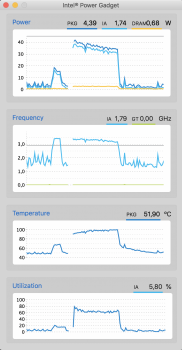MSI suggest TDP is closer to 150W at full tilt on the i9 and have beefed up the cooling on their laptops using the exact same chip as the 2018 MBP as a result.
https://www.msi.com/blog/why-8th-gen-core-i9-i7-and-i5-are-real-deal-and-faster-than-core-i7-7700hq
If you check the spec sheets for the i9 and the i7 they have the same TDP, despite the i7 being clocked slower, which makes no sense.
Intel's TDP figures are also based on some totally arbitrary load scenario.
For clarity I was only quoting Intel with the CPU at base clock speed at full load. If Intel claim 28W in this condition then pulling nearly double this value whilst still at base clock speed then there is a problem with the new i5 somewhere. This is either real (ie Intel problem) or a problem with the test. Given the apparent drop in performance it does not look like a test artefact.
The MSI article you linked to is a good one and, sticking with base clock speeds rather than turbo, they show the big i9 has a base TDP of 45W (ie a very hefty increase from the older i7). In this context the claimed 28W for the new i5 looks credible and yet in the i5 13" MBP test this little sucker was pulling over 50W (ie more than the TDP spec for the i9) whilst bouncing at or below the base frequency!
Something cannot be right with Intel if the base 8th gen i5 is pulling over 50W when operating at or below base cpu frequency. That amount of power does not just impact the thermals but will stress the amount of power margin the MBP has for all the other components too.



